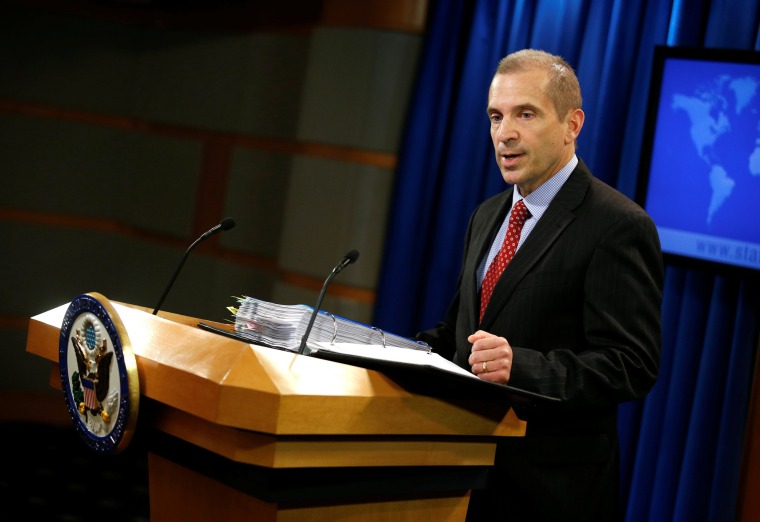Secretary of State Rex Tillerson plans on traveling to Japan, South Korea and China next week the State Department said Tuesday — a visit that was announced just hours after North Korea fired four banned ballistic missiles into Japanese waters.
The news about the upcoming trip also came as the State Department ended a two month drought on briefings with a spokesman insisting that the Trump administration was not dialing back on diplomacy. The trip will take on heightened importance in the wake of North Korea's provocations — actions Seoul and Tokyo say are a grave threat to regional security.
Acting State Department spokesman Mark Toner began the briefing by thanking the press for their patience as the new administration got its “sea legs”.
Toner also pushed back on insinuations that the State Department's voice has been absent, insisting that the agency's voice is heard "loud and clear in policy discussions at the National Security Council level."
Tillerson has been briefing President Trump about North Korea and other thorny foreign policy matters. Those issues include tension with Mexico over trade matters, the rise of ISIS and the impact on the region and delicate diplomatic matters with Russia, among others.

Tillerson "is very engaged with the White House, is very engaged with the president," Toner said. "He speaks to him frequently."
Toner fielded reporters' questions about the U.S. shipping a controversial anti-missile system to South Korea following North Korea's missiles test-launch. China said on Tuesday they firmly oppose the U.S. move and said America and South Korea would bear the ensuing consequences. The system, called THAAD, which stands for Terminal High Altitude Area Defense, is an anti-missile system designed to counter a threat like that from North Korea.
"China firmly opposes the United States and (South Korea) in deploying the THAAD anti-missile system in the (South Korea). We will surely take necessary measures to safeguard our own security interests," Geng Shuang, foreign ministry spokesman. "The United States and the (South Korea) will bear all the consequence arising therefrom. We, once again, strongly urge relevant parties to stop the deployment process and not to go any further down the wrong path."
Toner said the U.S. is focused on making sure South Korea has the means to defend itself against "aggression" from its northern neighbor.
"We've been very clear in our conversation with China that this is not meant to be a threat," Toner said. "It is not a threat to them or any other power of the region. It is a defensive system and it is in place, or it will be in place because of North Korea's provocative behavior."
Toner was also asked about Trump's latest controversial executive order, which suspends immigration to the U.S. from six mostly Muslim countries — but not Iraq.
"Obviously we would not lift them out of this group if we were not convinced and satisfied that they were taking measures to achieve our shared objective to prevent anyone with terrorist or criminal intent from reaching the U.S.," Toner said.
Toner struggled to explain whether Iran's placement among the six countries was due to their support of terrorist groups or their inability to properly provide required background information on their citizens seeking entry to the U.S. This is an especially challenging hurdle to overcome given that Iran and the U.S. do not currently have a way to communicate ways to improve information sharing.
Toner also said they were looking into the detaining of an American pastor named Andrew Brunson by Turkish authorities for allegedly having ties to a terrorist organization. His family claims he was targeted by the country's Islamist government for his religion.
"We've seen no clear evidence that Christians are being specifically targeted" by the Turkish government, Toner said.
Toner was asked about the multitude of remaining vacancies at top levels of the agency. He told the press corps to "take a deep breath", insisting the State Department is working to identify candidates and fill the positions as quickly as possible.
Tillerson still has not chosen a deputy. Numerous leadership positions and ambassadorships also remain open although the State Department points out that career diplomats are temporarily filling the roles.

